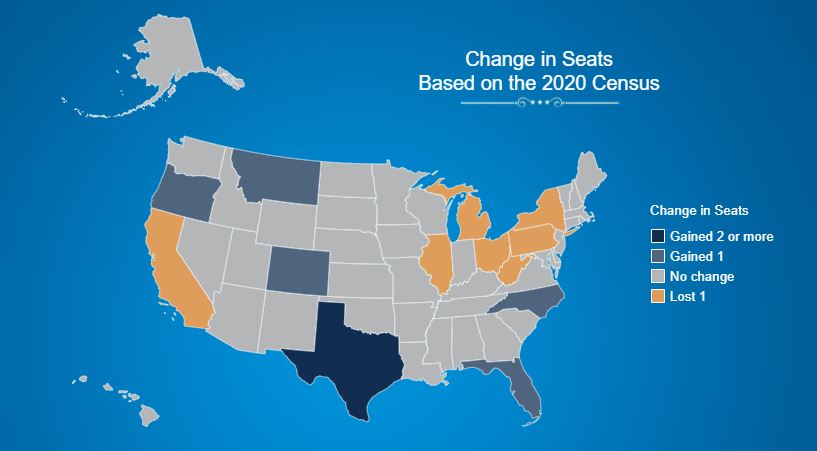Census Results Likely a Boost for GOP
The long shift of population from the Rust Belt to the Sun Belt continues---with the unusual exception of California.

As Doug Mataconis has noted in the Open Forum, the preliminary Census results are due out today and are likely to skew our representation further in the direction of the Republican Party, both because of how those states lean in presidential voting and because states controlled by that party’s politicians will control the resulting redistricting.
The Hill (“Census numbers expected to shift House power to the South, West“):
The U.S. Census Bureau will release the first results of its decennial survey on Monday after a decade of explosive growth in Sun Belt states that will shift power in the House of Representatives.
Acting Census Bureau Director Ron Jarmin will announce state population counts used to apportion House seats on Monday afternoon, the Census Bureau said early Monday.
Those results are likely to show a dramatic shift in population, as more Americans leave northern Rust Belt states in favor of sunnier climes where economic opportunity is more plentiful. Yearly population trends released over the last decade suggest five of the seven states likely to see their U.S. House delegations expand are in the Sun Belt.
Texas is certain to be the big winner this year. The state added at least 4 million new residents in the last decade, more than any other, as residents flocked to Austin, San Antonio, Houston, Dallas and their respective suburbs, many of which were among the fastest growing areas in the country.
Texas’s delegation in Congress is likely to grow by three seats, according to an analysis by the demographer Kimball Brace, who runs the nonpartisan firm Election Data Services.
Florida is also likely to gain two seats after a decade in which its population topped 20 million for the first time. North Carolina, Arizona and Colorado are the other Sun Belt states set to add one seat each to their delegations.
Residents moving to the West Coast will add two seats to Western state delegations, too: Both Oregon and Montana are expected to add seats to their delegations.
Population growth in the South and West is offset by continued stagnation in the Northeast and Midwest. New York, Pennsylvania, Ohio and Illinois are all expected to lose at least one seat each, continuing a losing streak those states started in the middle of the 20th century. West Virginia, Rhode Island, Michigan and Minnesota are expected to lose a seat each, as is Alabama, the only Southern state to see its delegation contract.
The major outlier, for the first time in the nation’s history, is California, which appears set to lose a seat in the House for the first time since it joined the Union in 1850. America’s most populous state added about 2.5 million residents in the last decade, but that growth will not be sufficient to maintain the state’s 53 seats in Congress.
Given the fixed size of the House, set in law at 435 seats back in 1929, all changes are zero-sum. Of the gaining states, only Oregon is reliably Democratic. This means the party’s chances of holding on to its slim majority next November, already difficult given the historic propensity of the President’s party to lose seats in the midterms, will get a whole lot harder.
Further, while the Census only directly impacts the House (each state gets two Senators regardless of population), it also impacts the Electoral College, since the formula there is that each state gets the same number of Electors as it does Representatives (again, a fluctuating number with a floor of 1) and Senators (again, fixed at 2).
Granted, these things can change over time. I’m old enough to remember when California was a rock-solid Republican state, having voted Democrat only once (the 1964 Goldwater massacre) between 1952 and 1988; it’s since voted blue in eight straight. Even more recently, North Carolina and my home state of Virginia have shifted from bright red to light blue. And even Georgia seems to be shifting into the Democratic column. While predictions of Texas following suit in 2020 were vastly overblown, it’s not inconceivable that the shift will materialize during the decennial in which this apportionment prevails.
Commenter @Scott wonders if the various attempts by the Trump administration to skew the Census results will be challenged in court. I’d just about guarantee it. I am highly skeptical, though, of any ruling against the ruling sticking though, and not just because the Supreme Court includes three Trump appointees. It’s going to be really difficult to prove harm and it’s not at all obvious what the remedy would be, anyway. The Constitution mandates the Census take place in years ending in 0 and, well, we’re now well into one ending in 1.
UPDATE: The press conference began at 3pm Eastern and this appears to be the breakdown:
- States that will GAIN a seat in Congress – MT – OR – CO – TX (2) – NC – FL
- States that will LOSE a seat: WV – PA – NY – OH – MI – CA – IL
While, again, this could change over time, it’s mostly good news for the GOP. It would seem a net gain of roughly four.
UPDATE 2: The Census has updated their site now and provided this graphic illustration:




These two statements would suggest it’s a matter of when not if. Get Out The Vote in Texas could be THE battlefront for the future of representative government in the US.
In another census twist, the Bureau has indicated it thinks it will deliver the detailed information needed to do redistricting by Sep 30. Colorado’s state constitution requires that the independent redistricting commission deliver its final proposal to the state supreme court by Sep 1.
Only a seven vote swing and electorally it looks like a plus 6 seat gain for Republicans in the EC. The margin in the House may be lower because many of the states are gerrymandered pretty heavily and it would be a tough squeeze (e.g., NC). Texas could easily split its seats. Florida is one of those states that is perfectly gerrymandered. PA does not allow gerrymandering so that should be interesting. So really not as bad as some Democrats feared.
The important thing to remember about the growth in Texas: A lot of that is coming from California–very blue parts of California. It’ll be interesting to see how that affects the mix (and if it can offset districting shenanigans).
With the shifts, the average congressional district has grown to ~760,000 people.
The cap really needs to be lifted.
Fun fact: while 435 was codified in the 1929 Permanent Apportionment Act, the number was first set in 1912.
You know, over a hundred years ago…
@mattbernius:
I got curious, so I checked out the ratio for the EU. It’s 1:634k
At that ratio, we’ve have 520 Representatives in the House. I thought it would be more.
@Michael Cain: Illinois has a similar timing problem written into its laws. I think it requires redistricting in July. Apparently it does not explicitly rely on the federal census so there’s an argument about whether to wait for the official census, guaranteeing a tardy process or using unofficial numbers on time, but risking (slightly) an inaccurate process.
The numbers are in.
Overall it looks like Republican will benefit from reapportionment but the gains will be somewhat marginal.
https://www.cnn.com/2021/04/26/politics/us-census-2020-results/index.html
@Mu Yixiao:
I would suggest setting up a ratio first. This would need to get bigger in time, or the House numbers become unmanageable.
In 1930 the US population was about 123 million. 435 House seats then meant 1 Representative per 282,758 people. Today the population is about 328 million. Keep that 1930 ratio and you get 1,160 seats in the House.
That’s not exactly an unmanageable number, but committees would be huge, or there’d be more committees.
@Michael Cain:
There’s an article in the state constitution that covers that:
Yay, Colorado gets more political power. Now if people would just stop moving here that would be great, it’s already too crowded. Especially Californians.
@Andy:
Thanks. You would think that by this time I would know better, and would read the statutes and constitution all the way to the end.
I live in Fort Collins now. At the stop light the other day I looked at the out-of-state license plates I could see. Texas, Oklahoma, Nebraska, two from Wyoming, and California. My daughter has lived here for several/many years now and says, “It would be okay if they came for school, but they never leave.” Population estimate is up past 180,000. From my back window I can see well over a hundred condos, townhouses, and non-attached houses under construction.
Moderator, did my post go to moderation or did it just vanish?
@Kathy: The rule of thumb in political science for half a century or so has been the cube root of the population. Roughly 691 representatives for 330 million.
@mattbernius:
I couldn’t agree more. Each member of Commons, the Assemblée nationale, and the Bundestag represents about 100,000 people. At 750,000 (at the least) our House is not really very representative.
@Michael Cain:
It’s the same in my area near C. Springs. House prices are crazy. My niece lives in Ft. Collins and loves it there and we love to visit. We briefly considered settling there three years ago when we moved back to CO, but it was too expensive for us and I needed to be closer to Denver for family reasons.
NPR had a piece out of West Virginia today. Declining population for 60 years, used to have 6 Congressmen, now 3, about to be 2 (I have 2 real good friends in WV so have some understanding). Outside the Panhandle area, it hasn’t changed in 50 years (Western Panhandle, ghost town, Potomac Highlands; Eastern Panhandle (Harper’s Ferry) boom town out of DC. Coal is DEAD.
My question is a little different. I’m not interested in the skewing of the results but the basic competence and accuracy of the results. One personal anecdote: filled out the census information on line and submitted it. No fewer than three census workers came by to get the family information because they had not record of either the on line census info or the various workers with their electronic pads.
So my question has been this: Since the census is constitutionally mandated is there a level of inaccuracy where a court would deem the census to be unconstitutional. The remedy would presumably be a redo.
While the shifts may turn out to be a boon to the GOP, the growth in Texas, Arizona, and North Carolina is likely to be in metro areas, which are trending more blue year after year. Could be a short-term Republican gain, but a long-term Republican pain.